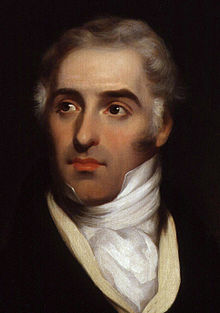Michael Thomas Sadler
| Michael Thomas Sadler | |
|---|---|
 |
|
| Member of Parliament for Newark | |
|
In office 1829–1831 |
|
| Member of Parliament for Aldborough | |
|
In office 1831–1832 |
|
| Personal details | |
| Born | 3 January 1780 Snelston, Derbyshire, Great Britain |
| Died | 29 July 1835 (aged 55) Belfast, Ireland, UK |
| Resting place | Ballylesson |
| Political party | Tory/Ultra-Tory |
| Religion | Church of England |
Michael Thomas Sadler (3 January 1780 – 29 July 1835) was a British Tory Member of Parliament (MP) whose Evangelical Anglicanism and prior experience as a Poor Law administrator in Leeds led him to oppose Malthusian theories of population and their use to decry state provision for the poor.
Michael Sadler entered the British House of Commons at the behest of the 4th Duke of Newcastle, returned by the pocket borough of Newark as an 'Ultra' opponent of Catholic emancipation, but he devoted much effort in Parliament to urging the extension of the Poor Law to Ireland. In 1832, in the last session of the unreformed House of Commons he brought forward a Bill to regulate the minimum age and maximum working hours of children (no more than ten hours for persons under eighteen) in the textile industry. He chaired a Select Committee on the Bill which heard evidence from witnesses on overwork and ill-treatment of factory children. No legislation had resulted before the Reform Act passed and in the election which followed Sadler stood for Leeds but failed to be elected. Parliamentary leadership of the factory reform movement passed to Lord Ashley. Publication of the evidence gathered by Sadler's Select Committee had a considerable effect on public opinion: the effect of Sadler's Bill and Committee on the Whig government was to persuade them that new factory legislation was required but that this should be based upon evidence gathered on a sounder basis. When he died, contemporaries mentioned his work on Ireland, population, and poverty as well as his ten-hour bill, but only the latter is now remembered.
...
Wikipedia
